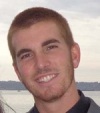 Communication/Leadership/Innovation/Business
Communication/Leadership/Innovation/Business
Maxwell Phelan’s perception of the world was transformed after he lived in Spain for six months, during which time he also traveled to Morocco, Greece, and Italy. He established lasting friendships and longs to expand this new network. On a deeper level, Max experienced the hardships inflicted on people and witnessed political protests, acts of violence, vandalism, and “unbelievable measures of poverty.” He gained tremendous respect for people and their struggles and believes the only way to gain a useful understanding of the issues depicted in the U.S. media is by speaking with those most directly affected.
“When you learn about the culture of other people, you also learn about yourself and the values that you uphold,” according to Max, who sees this as the basis of conflict resolution and thereby the prevention of violence. “We must first understand our own role in our community and country and step back in order to understand how we are perceived by others.”
Max sees clear and effective communication as the answer to many problems and admits to participating in classes “more than most,” especially if he’s able to set a positive tone that invites others to engage who might otherwise feel sidelined. In 2011, he was elected as the College of Arts and Letters Representative to serve as a liaison with the Associated Students Council of San Diego State University, responsible for representing thousands of students and their organizations. Discussions involving race, gender, sexuality, and multi-cultural issues often became highly emotional, so the decision-making process seemed overwhelming at times. At one session, over a dozen students representing the Mexican/Latino Culture argued spiritedly, and Max’s vote ultimately helped allocate their funding, a “fantastic experience” and one that helped him “grow morally, ethically, and socially as an individual.”
“Leaders must be able to adapt to a changing environment while still influencing others towards a main goal,” as Max has learned, and even more importantly, they need to know when to lead and when to follow. “No leader throughout history has ever been capable of being great without first following.” HSI offered a challenging opportunity to field test his assertions. A team-building obstacle course with a rope spanning two poles required a group effort to pass people through it without touching the rope. If everyone had tried to lead, Max pointed out, the task would have ended in failure instead of its actual exhilarating success.
Max has worked locally with a class, developing an online platform that helped people in poverty find jobs. He now concentrates efforts on malnourished children in eastern Africa and aims to start a company with a social purpose. After working as a sales manager for a beverage company, he is doing extensive research into camel’s milk and its advantages over cow’s milk. He intends to make a protein byproduct from this milk designed for children. Considering that human survival depends on clean water and food, Max sees no better place to concentrate his efforts. There are many different business options that he would like to pursue in order to help people around the world.

